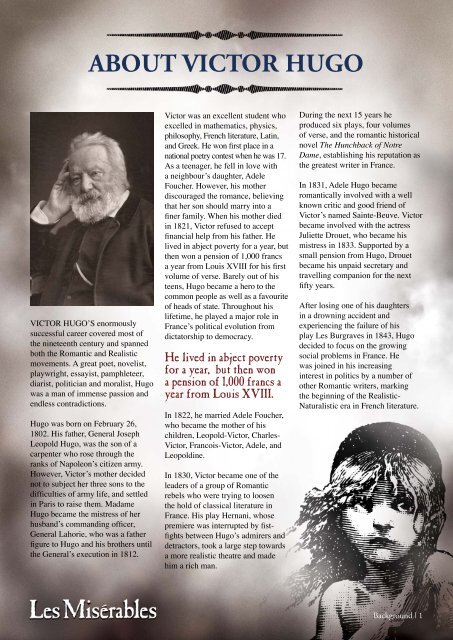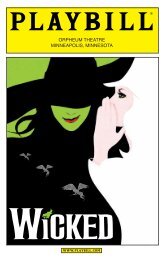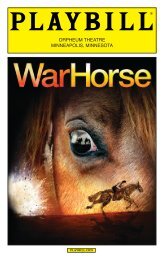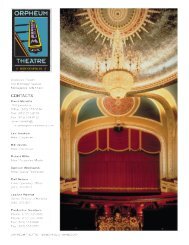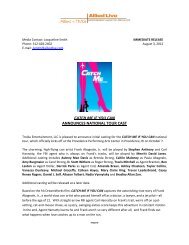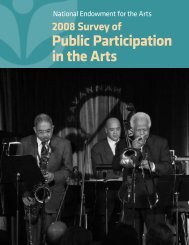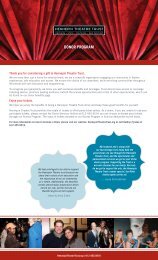ABOUT VICTOR HUGO - Hennepin Theatre Trust
ABOUT VICTOR HUGO - Hennepin Theatre Trust
ABOUT VICTOR HUGO - Hennepin Theatre Trust
You also want an ePaper? Increase the reach of your titles
YUMPU automatically turns print PDFs into web optimized ePapers that Google loves.
<strong>ABOUT</strong> <strong>VICTOR</strong> <strong>HUGO</strong><br />
<strong>VICTOR</strong> <strong>HUGO</strong>’S enormously<br />
successful career covered most of<br />
the nineteenth century and spanned<br />
both the Romantic and Realistic<br />
movements. A great poet, novelist,<br />
playwright, essayist, pamphleteer,<br />
diarist, politician and moralist, Hugo<br />
was a man of immense passion and<br />
endless contradictions.<br />
Hugo was born on February 26,<br />
1802. His father, General Joseph<br />
Leopold Hugo, was the son of a<br />
carpenter who rose through the<br />
ranks of Napoleon’s citizen army.<br />
However, Victor’s mother decided<br />
not to subject her three sons to the<br />
difficulties of army life, and settled<br />
in Paris to raise them. Madame<br />
Hugo became the mistress of her<br />
husband’s commanding officer,<br />
General Lahorie, who was a father<br />
figure to Hugo and his brothers until<br />
the General’s execution in 1812.<br />
Victor was an excellent student who<br />
excelled in mathematics, physics,<br />
philosophy, French literature, Latin,<br />
and Greek. He won first place in a<br />
national poetry contest when he was 17.<br />
As a teenager, he fell in love with<br />
a neighbour’s daughter, Adele<br />
Foucher. However, his mother<br />
discouraged the romance, believing<br />
that her son should marry into a<br />
finer family. When his mother died<br />
in 1821, Victor refused to accept<br />
financial help from his father. He<br />
lived in abject poverty for a year, but<br />
then won a pension of 1,000 francs<br />
a year from Louis XVIII for his first<br />
volume of verse. Barely out of his<br />
teens, Hugo became a hero to the<br />
common people as well as a favourite<br />
of heads of state. Throughout his<br />
lifetime, he played a major role in<br />
France’s political evolution from<br />
dictatorship to democracy.<br />
He lived in abject poverty<br />
for a year, but then won<br />
a pension of 1,000 francs a<br />
year from Louis XVIII.<br />
In 1822, he married Adele Foucher,<br />
who became the mother of his<br />
children, Leopold-Victor, Charles-<br />
Victor, Francois-Victor, Adele, and<br />
Leopoldine.<br />
In 1830, Victor became one of the<br />
leaders of a group of Romantic<br />
rebels who were trying to loosen<br />
the hold of classical literature in<br />
France. His play Hernani, whose<br />
premiere was interrupted by fistfights<br />
between Hugo’s admirers and<br />
detractors, took a large step towards<br />
a more realistic theatre and made<br />
him a rich man.<br />
During the next 15 years he<br />
produced six plays, four volumes<br />
of verse, and the romantic historical<br />
novel The Hunchback of Notre<br />
Dame, establishing his reputation as<br />
the greatest writer in France.<br />
In 1831, Adele Hugo became<br />
romantically involved with a well<br />
known critic and good friend of<br />
Victor’s named Sainte-Beuve. Victor<br />
became involved with the actress<br />
Juliette Drouet, who became his<br />
mistress in 1833. Supported by a<br />
small pension from Hugo, Drouet<br />
became his unpaid secretary and<br />
travelling companion for the next<br />
fifty years.<br />
After losing one of his daughters<br />
in a drowning accident and<br />
experiencing the failure of his<br />
play Les Burgraves in 1843, Hugo<br />
decided to focus on the growing<br />
social problems in France. He<br />
was joined in his increasing<br />
interest in politics by a number of<br />
other Romantic writers, marking<br />
the beginning of the Realistic-<br />
Naturalistic era in French literature.<br />
Background | 1
<strong>ABOUT</strong> <strong>VICTOR</strong> <strong>HUGO</strong><br />
Hugo was a moderate republican<br />
who was made a Peer of France in<br />
1845. After the Revolution of 1848<br />
and the founding of the Second<br />
Republic, he was elected a deputy<br />
to the Constitutional Assembly.<br />
Three years later, when Louis<br />
Napoleon abolished the Republic<br />
and reestablished the Empire, Hugo<br />
risked execution trying to rally the<br />
workers of Paris against the new<br />
Emperor. However, his efforts failed,<br />
and he had to escape to Brussels.<br />
As a result, Hugo spent the next<br />
decade in exile with his family<br />
and Mme. Drouet on the islands of<br />
Jersey and Guernsey. During these<br />
years, he wrote satires about Louis<br />
Napoleon, returned to his poetry and<br />
published several novels including<br />
Les Misérables, which he had begun<br />
years earlier.<br />
Over 3 million spectators<br />
follwed his cortege to the<br />
Pantheon.<br />
When Les Misérables was published<br />
in Brussels in 1862, it was an<br />
immediate popular success in spite<br />
of negative reaction by critics, who<br />
considered it overly sentimental, and<br />
the government, who banned it.<br />
After the Franco-Prussian War<br />
and the fall of the Empire in 1870,<br />
Hugo made a triumphant return to<br />
Paris. He remained there through<br />
the siege of the city and contributed<br />
portions of his royalties to purchase<br />
weapons. He lost two sons, one in<br />
1871 and one in 1873. Although he<br />
was elected to the Senate in 1876,<br />
poor health caused him to return to<br />
Guernsey. Mme. Hugo died in 1868<br />
and Mme. Drouet in 1882.<br />
Hugo died in 1885 at the age of<br />
eighty-three. Although he left<br />
instructions that his funeral be<br />
simple, over 3 million spectators<br />
followed his cortege to the Pantheon,<br />
where he was buried amid France’s<br />
great men. Hugo’s death came<br />
at the end of a century of war,<br />
civil conflict, brutally repressed<br />
insurrections such as the student<br />
rebellion in Les Misérables, and<br />
social injustice. Because of his belief<br />
in the triumph of good over evil and<br />
his pleading for tolerance and nonviolence,<br />
Victor Hugo was the herald<br />
of the new democratic spirit.<br />
Background | 2
<strong>ABOUT</strong> THE NOVEL<br />
LES MISÉRABLES is a melodramatic<br />
novel written from the premise<br />
that any man can rise above his<br />
circumstances to reach perfection.<br />
The plot of the novel is suspenseful<br />
from start to finish; it follows both<br />
Jean Valjean’s and society’s struggles<br />
with good and evil.<br />
Hugo began to think about Les<br />
Misérables as early as 1829. He<br />
observed the specific incident<br />
that triggers the novel’s action on<br />
the streets of Paris in 1845. On<br />
a sunny but cold day, he saw an<br />
impoverished man being arrested<br />
for stealing a loaf of bread. As<br />
the man stood on the street, an<br />
ornate carriage pulled up beside<br />
him. Inside there was a dazzlingly<br />
beautiful woman dressed in velvet,<br />
playing with a child hidden under<br />
ribbons, embroidery and furs. The<br />
impoverished man stared at the<br />
woman in the carriage, but she was<br />
totally unaware of him. Hugo wrote<br />
that he saw this man as, “the spectre<br />
of misery, the ghostly forewarning<br />
in full light of day, in the sunshine,<br />
of the revolution still plunged<br />
in the shadows of darkness, but<br />
emerging from them. The moment<br />
he become aware of her existence,<br />
while she remained unaware of his,<br />
a catastrophe was inevitable.”<br />
When Les Misérables<br />
was published in 1862, it<br />
generated more excitement<br />
than any book in the<br />
history of publishing.<br />
As the years passed, Les Misérables<br />
evolved as Hugo’s own life<br />
experiences shaped his philosophy.<br />
He incorporated personal memories<br />
of all kinds in the novel, often<br />
mixing everyday trivial fact with<br />
fiction to give the story a sense of<br />
journalistic truth. By the time it was<br />
published in 1862, it had become<br />
an epic novel, expressed in rich<br />
prose within a strong framework of<br />
history, philosophy, and political<br />
theory. “This is a leviathan I am<br />
about to ship out to sea,” he said<br />
before publishing.<br />
When Les Misérables was<br />
published in 1862, it generated<br />
more excitement than any book in<br />
the history of publishing. It was<br />
widely advertised in Paris with<br />
giant sketched portraits of Cosette,<br />
Fantine, Marius and Jean Valjean.<br />
Foreshadowing the success story of<br />
the musical, over one hundred years<br />
later, the novel Les Misérables was,<br />
initially, a popular, rather than a<br />
critical, triumph. “All the reviews,”<br />
wrote Hugo, “are reactionary and<br />
more or less hostile.”<br />
Like the musical, critical opinion<br />
had absolutely no effect on<br />
public interest in Les Misérables.<br />
Bookshop owners and other vendors<br />
literally battled to buy copies of the<br />
book for their customers. Long lines<br />
and traffic jams were observed all<br />
over the city as people fought to buy<br />
one of the 48,000 copies put on sale<br />
the first day.<br />
This phenomenon was echoed in<br />
1985, when the musical version of<br />
Hugo’s novel opened in London<br />
to mostly poor reviews. When<br />
Cameron Mackintosh, discouraged<br />
by the adverse critical response,<br />
called the box office, he was greeted<br />
by a happily busy ticket salesman.<br />
Background | 3
<strong>ABOUT</strong> THE NOVEL<br />
“I’m amazed you managed to get<br />
through,” Mackintosh was told,<br />
“the phones haven’t stopped<br />
ringing.” As with the novel, the<br />
story of Les Misérables had touched<br />
a common chord, and its great<br />
success was built on word of mouth.<br />
Hugo wrote about his book, “I don’t<br />
know if it will be read by everyone,<br />
but it is meant for everyone. It<br />
addresses England as well as Spain,<br />
Italy as well as France, Germany as<br />
well as Ireland, the republics that<br />
harbour slaves as well as empires<br />
that have serfs. Social problems<br />
go beyond frontiers...” To further<br />
his goal of presenting the ideas<br />
of Les Misérables to as wide an<br />
audience as possible, Hugo urged<br />
his publishers to bring out cheaper<br />
editions of the book in small print to<br />
make it available to ordinary people.<br />
The book was a sensation<br />
in America, whose own<br />
civil unrest at the time<br />
seemed to many to mirror<br />
the events and feelings of<br />
the novel.<br />
The initial French language success<br />
was copied all over the world as<br />
soon as the book became available<br />
in translation. The book was a<br />
sensation in America, whose own<br />
civil unrest at the time seemed<br />
to many to mirror the events and<br />
feelings of the novel. Indeed,<br />
Confederate soldiers read the novel<br />
voraciously, calling themselves<br />
“Lee’s Miserables.”<br />
As with any work of art pleading<br />
for social change, the novel<br />
Les Misérables acquired many<br />
enemies. Conservatives feared the<br />
social impact of the novel, and the<br />
Vatican banned it for several years.<br />
A theatrical version, written by<br />
Hugo’s son Charles, was banned<br />
in France, opening instead in<br />
Brussels. The French newspaper<br />
The Constitutionnel wrote that<br />
if the ideas of the novel were<br />
acknowledged, “no part of the social<br />
order would remain standing.”<br />
Nonetheless, Les Misérables has<br />
been translated into nearly every<br />
language and, during the past<br />
century, has become one of the bestselling<br />
books in history.<br />
Background | 4
<strong>VICTOR</strong> <strong>HUGO</strong> CHRONOLOGY<br />
1772<br />
Birth of Sophie-Francoise<br />
Trébuchet, Victor Hugo’s mother.<br />
1773<br />
Birth of Léopold-Sigisbert Hugo,<br />
Victor Hugo’s father.<br />
1789<br />
French Revolution begins.<br />
1798<br />
First French Republic proclaimed.<br />
1792 - 95<br />
The republican ‘Convention,’ ending<br />
in Robespierre’s terror.<br />
1793<br />
Louis XVI executed. The ‘Chouans’<br />
(royalist Breton insurgents) begin<br />
their full-scale civil war against<br />
the republican French government.<br />
Léopold-Sigisbert Hugo, an officer<br />
in the republican army, is posted to<br />
Britanny as part of the repressive<br />
peace-keeping force.<br />
1795 - 1799<br />
‘Le Directoire’, the first postrevolution<br />
government.<br />
1796<br />
Léopold-Sigisbert, on patrol, meets<br />
Sophie-Francoise Trébuchet, a<br />
Royalist, verifies her identity papers,<br />
searches her parents’ farm, and falls<br />
in love with her.<br />
1797<br />
Marriage in Paris of Sophie Trébuchet<br />
and Léopold-Sigisbert Hugo.<br />
1798<br />
Birth of Abel Hugo, Victor Hugo’s<br />
elder brother (who dies, insane,<br />
1855).<br />
1799 - 1804<br />
The ‘Consulat.’ Bonaparte takes<br />
command.<br />
1802<br />
Birth of Victor-Marie Hugo.<br />
1803<br />
Léopold-Sigisbert Hugo posted to<br />
Elba in disgrace, remains there with<br />
his three small sons (Eugene, the<br />
youngest, is born in 1803) while<br />
Sophie Hugo remains in Paris, and<br />
is befriended by General Victor<br />
Lahorie, her husband’s former<br />
commanding officer. Léopold and<br />
Sophie drift apart; he takes up with<br />
Catherine Thomas (a nurse), and<br />
begins living with her. Sophie Hugo<br />
finally rejoins her husband in Elba<br />
briefly, but they quarrel constantly.<br />
1804 - 1815<br />
French Empire; rise and fall of the<br />
Napoleonic Empire, ending with the<br />
battle of Waterloo.<br />
1804<br />
Napoleon crowns himself at Notre<br />
Dame; French Empire proclaimed.<br />
Sophie and her three children return<br />
to Paris, settling at 24 Rue de Chichy.<br />
General Lahorie, now retired and<br />
wanted by the police for plotting<br />
against Napoleon, lives at no.19.<br />
1807<br />
Léopold Hugo promoted colonel<br />
and posted to Naples, where he<br />
makes a favourable impression on<br />
Napoleon’s younger brother Joseph.<br />
1808<br />
Joseph Bonaparte is made King<br />
of Spain by Napoleon. Léopold<br />
Hugo follows the French King to<br />
Spain and gets a lucrative staff<br />
appointment.<br />
1811<br />
Sophie Hugo makes one last attempt<br />
to resume marital relations with<br />
Léopold, and joins him, with her<br />
family, in Spain. Léopold hears of<br />
his wife’s affair with Lahorie and<br />
sues her for divorce. Sophie and<br />
her children return to Paris a few<br />
months later.<br />
1812<br />
Lahorie is executed for plotting<br />
Napoleon’s downfall.<br />
1814<br />
Back in France, General Léopold<br />
Hugo distinguishes himself at the<br />
siege of Thionville. Sophie Hugo<br />
sues him for maintenance.<br />
1815<br />
France becomes a monarchy once<br />
more under Louis XVIII. General<br />
Léopold Hugo mistakenly hopes<br />
that by rallying to Louis XVIII in<br />
extremis he will be able to stay in<br />
the army. He is retired on half-pay.<br />
1815 - 1824<br />
Reign of Louis XVIII.<br />
1820<br />
Victor Hugo’s Ode to the Death<br />
of the Duc de Berri attracts the<br />
attention of the Court. Louis XVIII<br />
sends him 500 francs.<br />
1821<br />
Death of Sophie Hugo. Léopold<br />
Hugo marries his mistress, Catherine<br />
Thomas.<br />
1822<br />
Victor Hugo marries childhood<br />
sweetheart Adéle Foucher.<br />
1823<br />
Birth of Victor Hugo’s first son,<br />
Léopold Victor.<br />
Background | 5
<strong>VICTOR</strong> <strong>HUGO</strong> CHRONOLOGY<br />
1824 - 30<br />
Reign of Charles X.<br />
1824<br />
Birth of Victor Hugo’s first daughter,<br />
Léopoldine.<br />
1825<br />
Victor Hugo awarded the Légion<br />
d’Honneur for services to literature.<br />
1826<br />
Birth of Victor Hugo’s second son,<br />
Charles Victor.<br />
1828<br />
Death of General Léopold-Sigisbert<br />
Hugo. Birth of Victor Hugo’s third<br />
son, Francois-Victor.<br />
1830<br />
Premiere of Victor Hugo’s play,<br />
Hernani, interrupted by fist fights<br />
between admirers and detractors.<br />
Birth of second daughter Adéle.<br />
1830 - 1848<br />
Reign of King Louis Philippe.<br />
1831<br />
Victor Hugo publishes Notre-Dame<br />
de Paris.<br />
1832<br />
Hugo meets Juliette Drouet. Funeral<br />
of General Lamque – hero to<br />
workers and students – degenerates<br />
into riots, and the barricades<br />
described in Les Misérables.<br />
1836<br />
Applies for membership of<br />
Academie Française; fails.<br />
1839<br />
Second Academie Française election<br />
attempt again ends in failure.<br />
1841<br />
Victor Hugo finally elected to the<br />
Academie Française.<br />
1843<br />
Death of Léopoldine Hugo.<br />
1845<br />
Victor Hugo starts writing Les<br />
Misérables.<br />
1848 - 1851<br />
Reign of King Louis Philippe ends<br />
with uprising and Louis Napoleon<br />
becomes President of the Second<br />
French Republic<br />
1851<br />
2 December: Louis Napoleon<br />
dissolves Parliament, is proclaimed<br />
President with full powers for ten<br />
years, ratified by a plebiscite. Victor<br />
Hugo leaves hastily for Brussels.<br />
1852<br />
Louis Napoleon proclaims himself<br />
Emperor as Napoleon III. Victor<br />
Hugo settles first in Jersey then in<br />
Guernsey.<br />
1852 - 1870<br />
Emperor Napoleon III establishes<br />
cordial relations with Britain. Hugo<br />
vows not to set foot on French soil<br />
till his removal.<br />
1853<br />
Victor Hugo publishes poetry, Les<br />
Chaîtiments to great acclaim.<br />
1856<br />
Publication of more poetry, Les<br />
Contemplations.<br />
1861<br />
Victor Hugo completes Les<br />
Misérables.<br />
1862<br />
Les Misérables published in Paris<br />
and Brussels.<br />
1868<br />
Adéle Hugo dies.<br />
1870<br />
Franco-Prussian war ends with<br />
disastrous battle of Sedan. Napoleon<br />
III flees France and settles in<br />
England. October – Victor Hugo<br />
returns to Paris, is elected a member<br />
of parliament by the Parisiens.<br />
1871<br />
Victor Hugo resigns from<br />
Parliament; following the death of<br />
his son, Charles, he goes to Brussels<br />
to settle the family inheritance.<br />
1871<br />
April-May – Paris ‘Commune’<br />
uprising, soon crushed, leads to<br />
appalling carnage and repression.<br />
1871<br />
August – From Brussels, Hugo<br />
protests against the Belgian<br />
Government’s refusal to give fleeing<br />
‘Communards’ status of political<br />
exiles. His Brussels home is stoned<br />
and he is declared persona non grata<br />
in Belgium, moving to Luxembourg,<br />
returning briefly to Paris, then to<br />
Guernsey to write Quatre-Vingt-<br />
Treize.<br />
1875<br />
Victor Hugo settles permanently in<br />
Paris and is appointed Senator.<br />
1882<br />
Death of Juliette Drouet.<br />
1885<br />
23 May – Victor Hugo dies.<br />
1885<br />
1 June – State funeral attended by<br />
over three million people.<br />
Background | 6
<strong>ABOUT</strong> EMILE BAYARD<br />
EMILE BAYARD was Victor<br />
Hugo’s favourite illustrator, famous<br />
in his own lifetime for his brilliant<br />
portraits of Fantine, Éponine,<br />
Valjean and Javert, but best known<br />
today by people all over the world<br />
for “his” Cosette, used originally on<br />
the sleeve of the French ‘Les Mis’<br />
record in 1980, and now famous as<br />
the Les Misérables logo.<br />
Bayard, a prolific lithographer for<br />
magazines and books (he illustrated<br />
the works of Edmond About - then<br />
a fashionable novelist, almost as<br />
well-known as Hugo himself), was<br />
one of the leaders of the nineteenthcentury<br />
academic painting school,<br />
somewhat unjustly known as “le<br />
style pompier”.<br />
With infinite attention to detail,<br />
Emile Bayard worked for months<br />
on huge paintings, of which the<br />
best known are “After the Battle<br />
of Waterloo” and “Sedan 1870”.<br />
His real talent, however, lay in his<br />
abilities as a brilliant portraitist.<br />
In the tradition of the time, he also<br />
used his drawing skills to rework<br />
original sketches by explorers<br />
and travellers, sometimes even<br />
transforming pictures of exotic<br />
places into lithographs. A close<br />
friend of Honorè Daumier and<br />
cartoonists such as Paul Gavarni,<br />
Henri Monnier, Alfred Grevin,<br />
Jean-Louis Forain and Emmanuel<br />
Poiré (better known as Caran<br />
d’Ache), he wrote about their<br />
work about spotting fakes, and<br />
identifying antiques.<br />
Cosette<br />
Emile Bayard<br />
Quintessentially a wealthy Parisian<br />
“society painter” with pupils and his<br />
own atelier, Emile Bayard showed<br />
a remarkable understanding of<br />
Victor Hugo’s work as seen in his<br />
illustrations of the cast of characters<br />
in Les Misérables.<br />
Background | 7
CHRONOLOGY<br />
THE HISTORY that led to the novel<br />
and the musical.<br />
1845<br />
Victor Hugo starts writing Les<br />
Misérables.<br />
1848 - 1851<br />
Reign of King Louis Philippe ends<br />
with uprising and Louis Napoleon<br />
becomes President of the Second<br />
French Republic.<br />
1792<br />
First French Republic declared.<br />
1792 - 95<br />
The republican “Convention”,<br />
ending in Robespierre’s “terror”.<br />
1793<br />
Louis XVI executed. The Royal<br />
insurgents begin their full scale civil<br />
war against the republican French<br />
Government. Victor Hugo describes<br />
this conflict in his novel 93.<br />
1795 - 99<br />
“Le Directoire” becomes the first<br />
post-revolution government.<br />
1799 - 1804<br />
“The Consulate”; Napoleon<br />
Bonaparte takes command.<br />
1804 - 15<br />
French Empire; the rise and fall of<br />
Napoleon, ending with the battle of<br />
Waterloo.<br />
1815<br />
France becomes a monarchy again<br />
with Louis XVIII as King.<br />
1824 - 30<br />
The reign of Charles X.<br />
1832<br />
Death of General Lamarque, a hero<br />
to workers and students. His funeral<br />
degenerates into riots, described by<br />
Hugo in Les Misérables.<br />
1848 - 51<br />
Regime of Louis Phillipe ends<br />
with uprising and Louis Napoleon<br />
becomes president of the Second<br />
Republic. He dissolves Parliament<br />
and is given full powers for ten<br />
years.<br />
1852<br />
Louis Napoleon declares himself<br />
Emperor. Hugo urges the populace<br />
to rise against the monarch and flees<br />
the country to Belgium.<br />
1862<br />
Victor Hugo publishes Les<br />
Misérables, written in exile.<br />
1870<br />
Louis Napoleon is forced to abdicate<br />
and is replaced by a democratically<br />
elected government. Hugo returns to<br />
France in triumph.<br />
1885<br />
Hugo dies. Two million mourners<br />
pay their respects at his massive<br />
funeral.<br />
1906<br />
The first silent film of Les<br />
Misérables is directed in France by<br />
Albert Capellini.<br />
1910<br />
The first American film, Galley<br />
Slaves, is produced as a silent film,<br />
directed by James Stuart Blackton.<br />
1935<br />
The first American sound version is<br />
produced by Richard Boleslawski.<br />
1980<br />
The original arena production of<br />
the Boublil-Schönberg musical, Les<br />
Misérables, is presented at the Palais<br />
des Sports, Paris.<br />
1985<br />
Les Misérables opens at the<br />
Barbican <strong>Theatre</strong> in London.<br />
1987<br />
Les Misérables opens at the<br />
Broadway <strong>Theatre</strong> in New York.<br />
Background | 8
And remember<br />
The truth that once was spoken,<br />
To love another person<br />
Is to see the face of God.<br />
THE CHARACTERS<br />
QUESTIONS /<br />
DISCUSSION IDEAS<br />
• What is Hugo’s view of human<br />
nature Is it naturally good,<br />
flawed by original sin, or<br />
somewhere between the two<br />
• Describe how Hugo uses his<br />
characters to describe his view<br />
of human nature. How does<br />
each character represent another<br />
facet of Hugo’s view<br />
• Discuss Hugo’s undying belief<br />
that man can become perfect.<br />
How does Jean Valjean’s life<br />
illustrate this belief<br />
• In the end, what does Jean<br />
Valjean prove with his life<br />
• Javert is a watchdog of the legal<br />
process. He applies the letter<br />
of the law to every lawbreaker,<br />
without exception. Should he<br />
have applied other standards to a<br />
man like Jean Valjean<br />
• Today, many believe, like Javert,<br />
that no mercy should be shown<br />
to criminals. Do you agree with<br />
this Why<br />
• What does Javert say about his<br />
past that is a clue to his nature<br />
• What finally destroys Javert<br />
Hugo says he is “an owl forced<br />
to gaze with an eagle.” What<br />
does this mean<br />
• Discuss the Thénardiers as<br />
individuals living in a savage<br />
society who have lost their<br />
humanity and become brutes.<br />
Are there people in our society<br />
who fit this description<br />
• Compare Marius as a romantic<br />
hero with the romantic heroes of<br />
other books, plays or poems of<br />
the romantic period.<br />
• What would Eponine’s life have<br />
been like if she had not been<br />
killed at the barricade<br />
• Although they are only on stage<br />
a brief time, both Fantine and<br />
Gavroche have vital roles to<br />
play in Les Misérables and a<br />
deep impact on the audience.<br />
What makes them such powerful<br />
characters What do they have<br />
in common Name some other<br />
characters from literature that<br />
appear for a short time, but have<br />
a lasting impact.<br />
Study Guide | 1
“You are right, Sir, when you say that<br />
Les Misérables is written for a universal audience.<br />
I don’t know whether it will be read by everyone,<br />
but it is meant for everyone”<br />
Victor Hugo<br />
THE UNIVERSAL STORY<br />
QUESTIONS/<br />
DISCUSSION IDEAS<br />
• Les Misérables is one of the<br />
most widely read novels of all<br />
time, and the show has been<br />
received with immense success<br />
around the world. How do<br />
you explain its great appeal<br />
to so many different kinds of<br />
audiences over more than 130<br />
years<br />
• List the universal themes in Les<br />
Misérables.<br />
• What makes a theme<br />
“universal”<br />
• Name some universal themes in<br />
one of the following works (or<br />
pick one more familiar to you):<br />
1. Hamlet<br />
2. The Red Badge of Courage<br />
3. Great Expectations<br />
4. Julius Caesar<br />
5. The Scarlet Letter<br />
6. Of Mice and Men<br />
7. Macbeth<br />
8. A Tale of Two Cities<br />
• Why have these works stood the<br />
test of time, while other works<br />
have been forgotten<br />
• What themes do they share with<br />
Les Misérables<br />
ASSIGNMENTS/<br />
RESEARCH AND<br />
WRITING PROJECTS<br />
Relate the themes of<br />
• Les<br />
Misérables to events occuring<br />
in your community, England, or<br />
the world today. After reading or<br />
seeing Les Misérables, describe<br />
how it has changed the way you<br />
think about these events.<br />
Study Guide | 2
Look down and see the beggars at your feet<br />
Look down and show some mercy if you can<br />
Look down and see the sweepings of the street<br />
Look down, look down upon your fellow man!<br />
THE HOMELESS AND THE POOR<br />
THE BASIC problem central to<br />
Hugo’s work is stated in its title:<br />
Les Misérables, or “the miserable<br />
ones.” Today, we would call them<br />
the poor, or the homeless. Poverty<br />
is an international problem which<br />
continues to grow every year.<br />
QUESTIONS/<br />
DISCUSSION IDEAS<br />
• How do you feel about the<br />
homeless and the poor<br />
• Who do you feel is responsible<br />
for their problems Themselves<br />
The government Society in<br />
general Why<br />
• How do you think poor people<br />
feel about the way they are<br />
treated<br />
• In Les Misérables, the beggars<br />
sing “When’s it going to<br />
end When we gonna live<br />
Something’s gotta happen now<br />
or something’s gonna give”;<br />
what do they mean by this<br />
• In the story of Les Misérables,<br />
what reforms does Victor Hugo<br />
indirectly or directly advocate to<br />
fight social injustice<br />
• How do Hugo and the creators<br />
of the musical show the<br />
audience what social action is<br />
needed to correct these evils<br />
• Each of the characters in the<br />
story deal with the problem of<br />
Les Misérables in a different<br />
way. Describe how each of these<br />
characters see the poor:<br />
1. Jean Valjean<br />
2. The Bishop of Digne<br />
3. Javert<br />
4. Enjolras<br />
5. Thénardier<br />
• Which of these viewpoints do<br />
you agree with Which do you<br />
think Victor Hugo agreed with<br />
ASSIGNMENTS/<br />
RESEARCH AND<br />
WRITING PROJECTS<br />
• Hugo attempted to convince his<br />
audience that the poor and the<br />
outcast are worth saving. In our<br />
society, is this belief commonly<br />
held Why or why not<br />
• Explore the conditions under<br />
which most common people<br />
worked in Hugo’s time. What<br />
kinds of factory conditions<br />
were they forced to endure<br />
How do they differ from<br />
conditions workers deal with<br />
today Explore the influences<br />
of unions, child labour laws,<br />
environmental protection laws.<br />
• Alain Boublil was influenced<br />
to begin the musical of<br />
Les Misérables after the<br />
character of the Artful Dodger<br />
in the musical Oliver! (based<br />
on Charles Dickens’ novel<br />
Oliver Twist) brought to mind<br />
a singing Gavroche. Trevor<br />
Nunn and John Caird used<br />
techniques on Les Misérables<br />
they developed while directing<br />
Nicholas Nickleby, an adaptation<br />
of Dickens’ novel.<br />
• Compare Dickens and Hugo as<br />
authors and social crusaders<br />
• Compare the social problems<br />
and solutions in Les Misérables<br />
to situations addressed in works<br />
of Dickens such as: A Tale of<br />
Two Cities, Great Expectations,<br />
Hard Times, A Christmas Carol.<br />
• Compare Victor Hugo and<br />
his work in Les Misérables<br />
with the work of one of these<br />
modern social crusaders: George<br />
Bernard Shaw, Henrick Ibsen,<br />
Arthur Miller, John Steinbeck.<br />
Study Guide | 3
Now every door is closed to me<br />
Another jail, another key, another chain<br />
For when I come to any town<br />
They check my papers<br />
And they find the mark of Cain<br />
CRIME AND PUNISHMENT<br />
QUESTIONS/<br />
DISCUSSION IDEAS<br />
When we first meet Jean Valjean, he<br />
has been in prison for 19 years for<br />
stealing a loaf of bread. The harsh<br />
punishment for theft in the 19th<br />
Century was rooted in the belief<br />
that theft was a crime against the<br />
entire community and should be<br />
punishable by extreme means, no<br />
matter how petty the crime.<br />
• How do we think about theft in<br />
our society<br />
• Should all crimes be punished<br />
in the same way Should<br />
the reason behind a crime<br />
have anything to do with the<br />
punishment<br />
• Have you ever had anything<br />
stolen from you How did it<br />
make you feel Would it have<br />
mattered if someone had stolen<br />
from you to feed his/her family<br />
When Valjean is released from<br />
prison he is given a yellow ticket<br />
of leave, effectively branding him a<br />
criminal to all he meets, making it<br />
impossible for him to lead a normal<br />
life again.<br />
• How does our society treat<br />
people on parole, or ex-convicts<br />
Are they able to lead normal<br />
lives again Why or why not<br />
• A great percentage of convicts<br />
released from prison end up<br />
back in jail soon after. Why is<br />
this, and what does it say about<br />
our “rehabilitation” system<br />
ASSIGNMENTS/<br />
RESEARCH AND<br />
WRITING PROJECTS<br />
• Trace the concept of crime<br />
and punishment from the 12th<br />
through the 20th Century. What<br />
can you learn about a society<br />
from how it treats criminals<br />
• Do you believe we have an<br />
effective system of justice in<br />
England Why or why not<br />
• The figure of Justice is always<br />
portrayed as being blindfolded,<br />
that is, completely blind to<br />
anything but objective facts.<br />
• Write an essay about your<br />
thoughts on “blind justice”.<br />
Is justice ever completely blind<br />
Is it ever completely blind in<br />
Les Misérables<br />
• Both Jean Valjean and<br />
Thénardier commit crimes in<br />
Les Misérables: Valjean first<br />
steals food to feed his family,<br />
then breaks parole when he<br />
is treated like an outcast by<br />
society, while Thénardier<br />
commits fraud and robbery for<br />
his own ends. Remember the<br />
blindfolded figure of Justice:<br />
should Valjean and Thénardier<br />
be treated differently by the<br />
Justice system Is there a place<br />
for mercy in the Law How so<br />
Study Guide | 4


